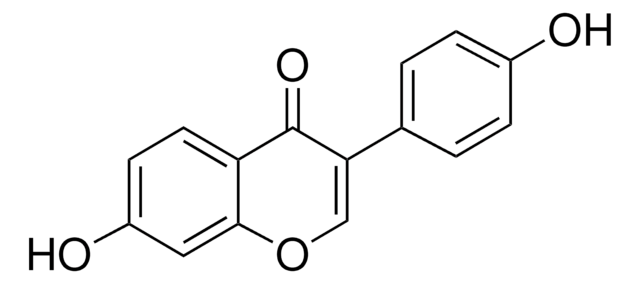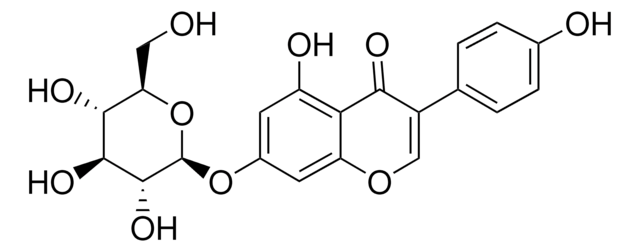G6776
Genistein
from Glycine max (soybean), ~98% (HPLC)
Synonym(s):
4′,5,7-Trihydroxyisoflavone, 5,7-Dihydroxy-3-(4-hydroxyphenyl)-4H-1-benzopyran-4-one
About This Item
Recommended Products
biological source
Glycine max (soybean)
Quality Level
Assay
~98% (HPLC)
form
powder
mp
>280 °C
solubility
DMSO: soluble
ethanol: soluble
storage temp.
−20°C
SMILES string
Oc1ccc(cc1)C2=COc3cc(O)cc(O)c3C2=O
InChI
1S/C15H10O5/c16-9-3-1-8(2-4-9)11-7-20-13-6-10(17)5-12(18)14(13)15(11)19/h1-7,16-18H
InChI key
TZBJGXHYKVUXJN-UHFFFAOYSA-N
Gene Information
human ... AKT1(207) , CYP19A1(1588) , EGFR(1956) , ESR1(2099) , ESR2(2100)
mouse ... Esr1(13982) , Hexa(15211)
rat ... Adora1(29290) , Adora2a(25369) , Ar(24208)
Looking for similar products? Visit Product Comparison Guide
General description
Application
- as an anticancer agent to test its cytotoxicity in cervix adenocarcinoma cells
- as a polyphenol to test its effect on reactive oxygen species in mitochondria from sperm
- to test its radical scavenging effect on the UV irradiated in dermal and keloid fibroblasts
Biochem/physiol Actions
Features and Benefits
Signal Word
Warning
Hazard Statements
Precautionary Statements
Hazard Classifications
Acute Tox. 4 Oral
Storage Class Code
11 - Combustible Solids
WGK
WGK 3
Flash Point(F)
Not applicable
Flash Point(C)
Not applicable
Personal Protective Equipment
Certificates of Analysis (COA)
Search for Certificates of Analysis (COA) by entering the products Lot/Batch Number. Lot and Batch Numbers can be found on a product’s label following the words ‘Lot’ or ‘Batch’.
Already Own This Product?
Find documentation for the products that you have recently purchased in the Document Library.
Customers Also Viewed
Our team of scientists has experience in all areas of research including Life Science, Material Science, Chemical Synthesis, Chromatography, Analytical and many others.
Contact Technical Service







